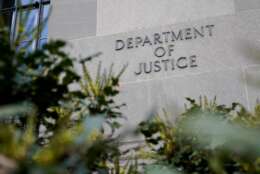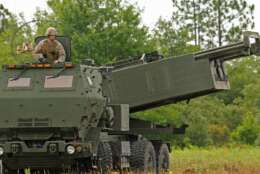Tom Temin
-
While federal agencies search endlessly to hire people skilled in cybersecurity, local government might have a different way. How about enlisting volunteers to help protect critical infrastructure from cyber attacks. That's the idea behind a detailed set of recommendations from the law firm McDermott Will & Emery.
May 04, 2023 -
Federal retirement tends to stand like a three-legged stool: the FERS annuity, the Thrift Savings Plan and Social Security. But a fourth leg could make for an even sturdier retirement. Good old fashioned Savings Bonds are another instrument federal employees can invest in for their personal savings.
May 04, 2023 -
The Coast Guard has long worked to boost its capabilities of operating in the Arctic, an area of increasing importance to national security. Now the Homeland Security Science and Technology Directorate will fund research aimed at helping other Department of Homeland Security (DHS) components operate in the Arctic.
May 04, 2023 -
In today's Federal Newscast: The Justice Department's National Security Division expands big time, as it adds over two dozen new prosecutors to fight corporate crime. The backlog of Freedom of Information Act requests across government reaches new heights. And VA whistleblowers continue to increase their win-loss record.
May 04, 2023 -
The National Geospatial Intelligence Agency picked a systems integrator for a computer vision project. The integrator, CACI, started to develop a proprietary function that a commercial company already offered. You can guess what happened.
May 03, 2023 -
he Bureau of Prisons, an agency of the Justice Department, made two highly visible lists within couple of weeks. It placed at the very bottom of the list of Best Places to Work in the Federal Government, meaning its employees rank it as the worst place. And, it joined the three dozen other programs on the Government Accountability Office's High Risk List. For why it made the High Risk List, the Federal Drive with Tom Temin spoke with GAO's Director of Homeland Security and Justice Issues, Gretta Goodwin.
May 03, 2023 -
A new campaign from the Army Reserve looks to reach those that want to serve, but also still strive towards their goals in other career fields.
May 03, 2023 -
Though he faced "headwinds" of bias, Vince Stewart rose to high rank on merit
May 03, 2023 -
In today's Federal Newscast: That new electric mail truck you've been waiting for is going to be about eight months late. As Army recruitment numbers continue to be down, the service is stepping up its sales classes for recruiters. And the 2024 CXO Fellows Program is taking applications.
May 03, 2023 -
The U.S. Marine Corps is currently embarking on a restructuring plan know as Force Design 2030. It looks to reshape its combat power for future conflicts with near-peer adversaries, i.e. China.
May 02, 2023 -
Right now, the Supreme Court is considering a case that could boost federal whistleblowers bringing forth wrongdoing by contractors under the False Claims Act. The case underscores the importance of intent and its relevance in these cases.
May 02, 2023 -
Last week, the Senate Armed Services Committee (SASC) heard testimony, regarding a so-called "revolving door" between the Pentagon and companies to which it awards contracts. The SASC's Personnel Subcommittee presented a report from Sen. Elizabeth Warren (D-Mass.) on the topic.
May 02, 2023 -
In today's Federal Newscast: A new Senate bill addresses staffing shortages at airports and other ports of entry. A black Lt. Gen, who ran the Defense Intelligence agency, dies at 64. And President Biden makes COVID mandates a thing of the past.
May 02, 2023 -
Five architectural firms are now at work on proposals for a brand new museum for the Navy. To learn more about why the Navy will build a new museum, as well as to hear about the Navy's vision for the new facility.
May 01, 2023 -
It's called Kestrel, but it's not a falcon catching mice. It's the newest Energy Department supercomputer. Kestrel just arrived at the National Renewable Energy Laboratory in Golden, Colorado.
May 01, 2023















